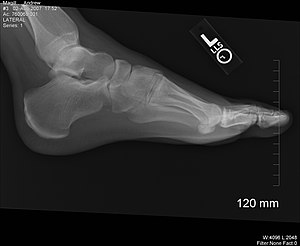 |
| X-ray (Photo credit: Wikipedia) |
Bunions may respond to conservative treatment if they are diagnosed early. A change of shoes would normally be required to accommodate the bunion and keep pressure off the area. You could wear a pair of sandals that is non-restrictive. However, other options may include:
- Customized or pre-fabricated orthotics
- A bunion sleeve
- Anti-inflammatory medications
- Injections of steroidal medications
Surgical removal of a bunion is referred to as a bunionectomy and is usually only performed if your bunions hamper your day to day activities. A bunionectomy involves removal of the bone and swollen tissue around the big toe joint. The toe then undergoes straightening and realignment before the incision is closed. The more mild the case of bunions, the lesser the tissue damage at the time of surgery. This may hasten the recovery period somewhat. The decision made to have bunion surgery should not be taken lightly. There is a six to eight week recovery period during which time a special shoe, boot or cast may have to be worn. You may also have to probably miss several weeks of work while the foot heals.
Bunion surgery is not without possible risks of pain, infection or nerve damage, and since bunions have some genetic link, they can possibly reoccur.
If you show signs near the base of the big toe joint you may be developing a bunion. Symptoms include:
- Redness
- Swelling
- Development of corns and callouses
- Pain
References:
http://www.surgeryencyclopedia.com/A-Ce/Bunionectomy.html





